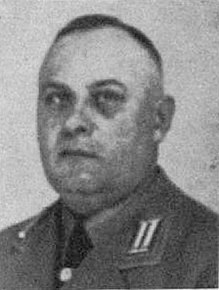Berthold Karwahne
Berthold Karwahne (born October 3, 1887 in Koberwitz , † November 14, 1957 in Krainhagen ) was a German politician ( KPD , NSDAP )
Life
Karwahne was the only son of a locksmith. He learned his father's profession in a small business in Hanover and worked there as a journeyman until he was called up for military service in 1907 . After the end of his service, he worked as an auxiliary fitter from September 1909 and as a fitter at the gas works from 1912. During the First World War he volunteered and was deployed at the front until the end of the war, most recently as a medical sergeant. In 1919 he returned to the gas works as a chief fitter, where he worked until 1926. Then he became an installation foreman in the foreman’s office of the municipal companies and was employed there the following year.
politics
Karwahne belonged to the USPD in the mid-1920s and then to the KPD, which he represented in the Hanover city council. In the internal disputes he belonged to the “ultra-left” group around Iwan Katz and was expelled from the party on January 11, 1926 after the attempted occupation of the editorial building of the KPD organ Niedersächsische Arbeiterzeitung . With the group around Katz, Karwahne merged with the AAUE around Franz Pfemfert in November 1926 to form the Spartacus League of Left Communist Organizations , which he left two months later.
A little later, Karwahne joined the NSDAP, for which he was a member of the Reichstag from 1930 to 1945. He became the most important representative of the NSBO in the province of Hanover and was a member of the provincial parliament of the province of Hanover from 1929 to 1932 for the constituency of Nienburg-Hoya and in 1933 for the constituency of Hanover-Stadt.
After the seizure of his party in 1933, he was also in the administration confiscated union property and as an official of the German Labor Front operates. In the Reichstag fire trial, he seriously incriminated the defendant Torgler. The proven false statements were not taken into account in the judgment. At the beginning of 1936 he was appointed a paid councilor in Hanover. From 1938 he headed the city's personnel, salary and social services office.
In the denazification process in 1949, he was classified in Group III (probation group for those with minor charges) when his property was confiscated.
literature
- Dirk Böttcher , Klaus Mlynek, Waldemar R. Röhrbein, Hugo Thielen: Hannoversches Biographisches Lexikon . From the beginning to the present. Schlütersche, Hannover 2002, ISBN 3-87706-706-9 , p. 194.
- Klaus Mertsching, Berthold Karwahne: Biography of a Hanoverian NS great. In: Hannoversche Geschichtsblätter NF 38 (1984), pp. 218-236.
- Karwahne, Berthold . In: Hermann Weber , Andreas Herbst : German Communists. Biographical Handbook 1918 to 1945 . 2nd, revised and greatly expanded edition. Karl Dietz, Berlin 2008, ISBN 978-3-320-02130-6 .
- Hermann Weber: The change in German communism. The Stalinization of the KPD in the Weimar Republic . Frankfurt / Main 1969, Vol. 1, pp. 139-142 and Vol. 2, p. 178.
- Erich Stockhorst: 5000 people. Who was what in the 3rd Reich . Arndt, Kiel 2000, ISBN 3-88741-116-1 (unchanged reprint of the first edition from 1967).
- Beatrix Herlemann , Helga Schatz: Biographical Lexicon of Lower Saxony Parliamentarians 1919–1945 (= publications of the Historical Commission for Lower Saxony and Bremen. Volume 222). Hahnsche Buchhandlung, Hanover 2004, ISBN 3-7752-6022-6 , pp. 183-184.
Web links
- Berthold Karwahne in the database of members of the Reichstag
| personal data | |
|---|---|
| SURNAME | Karwahne, Berthold |
| BRIEF DESCRIPTION | German politician (KPD, NSDAP), MdR |
| DATE OF BIRTH | October 3, 1887 |
| PLACE OF BIRTH | Koberwitz |
| DATE OF DEATH | November 14, 1957 |
| Place of death | Krainhagen, district of Obernkirchen |
